Issue 215 – 6 March 2025

| Welcome to Practice Connect, a fortnightly update for practice managers, principals, nurses and administration staff on relevant issues, upcoming events and education. |

Ensure to use the correct Medicare Provider Number when claiming GPACI- eligible services

Some General Practice in Aged Care Incentive (GPACI) registered practices and their GPs may not have received a payment that they expected because the incorrect Medicare Provider Number (MPN) was used when claiming GPACI-eligible services.
The Organisation Register recognises Organisation Sites (that is, practice locations), not the overall Organisation entity. GPs who practice out of more than one location (site) have a different MPN for each location.
Therefore, GPs (or practice staff on their behalf) must ensure that the MPN used for claiming services for each individual patient is the MPN for the same Organisation Site in which:
- the patient is registered for MyMedicare and GPACI, and
- the GP has been added as the Responsible Provider for that patient.
It is important to remember that for a service to be considered eligible:
- it must be on the list of GPACI-eligible MBS/DVA service items
- the patient must have the GPACI Indicator selected, and a Responsible Provider nominated on their MyMedicare profile
- the Responsible Provider must deliver at least one of the two regular services (which must be delivered in separate calendar months) to the patient during the quarter, on or after the day they were nominated as the Responsible Provider in the Organisation Register, and
- the MPN used to claim the services must be for the same practice location as the Organisation Site where the patient who received the services is registered for MyMedicare and GPACI.
For further information, visit the Services Australia MyMedicare resources webpage or call the Practice Assist help desk on 1800 2 ASSIST (1800 2 277 478 or 08 6278 7900) or email practiceassist@wapha.org.au
Proposed MyMedicare bulk billing incentive – update from the Australian Government
Following the recent announcement by the Australian Government on the proposed expansion of bulk billing eligibility and introduction of a new bulk billing practice incentive program; the Australian Government Department of Health and Aged Care (DoHAC) has provided the following update for general practices:
Expanded bulk billing incentive eligibility from 1 November 2025:
- The proposed measure will allow GPs to claim bulk billing incentive items when they bulk bill any Medicare-eligible patient.
- Would be available for all practices to participate in from 1 Nov 2025.
New Bulk Billing Practice Incentive Program:
- The proposed incentive would introduce a 12.5 per cent loading payment on every $1 of MBS benefit earned from GP non-referred attendance (NRA) services, to be split between the GP and the practice. Further detail on the determined split is yet to be released. To be eligible to participate in the Program, practices will need to:
- Commit to bulk billing all NRA services
- Advertise their participation in the Program within the practice and on Healthdirect’s National Health Services Directory
- Be registered with MyMedicare (accreditation requirements will be waived for two years for practices joining the Program)
- Register with the Services Australia Health Professional Online Services Organisation Register. Further details on the registration process are yet to be released.
Payments would commence in 2026 and will be issued quarterly.
More information is available in the DoHAC fact sheet and the DoHAC More Bulk Billing Information and Case Study resource. WA Primary Health Alliance will provide further information on this proposed election commitment as soon as it becomes available.For more information and guidance with MyMedicare, contact Practice Assist on 1800 2 ASSIST (1800 2 277 478 or 08 6278 7900) or via email practiceassist@wapha.org.au
Did you know that you can now access your practice data summary reports?
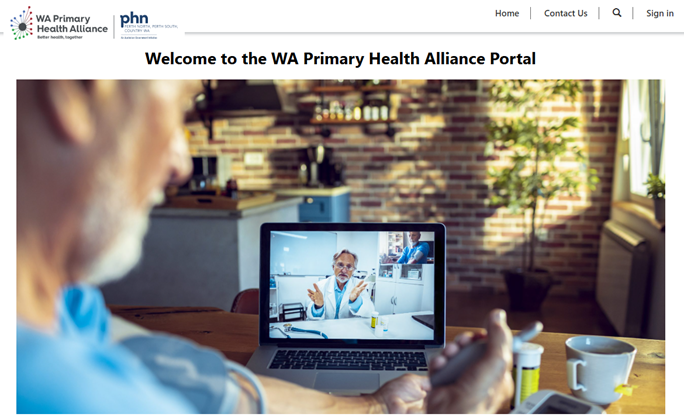
General Practices sharing data with WA Primary Health Alliance (WAPHA) for PIP QI, can now access their practice data reports through the Primary Care Reporting Portal (PCRP).
The Primary Care Reporting Portal (PCRP) is designed to be intuitive and easy to use and aim to replace the requirement on receiving manual PDF reports from WAPHA.
The PCRP offers on demand access to your practices data, and as an added benefit you will also be able to view these reports in an enhanced visual format through dashboard Power BI reporting.
The PCRP provides:
1. My Practice Data Report.
2. Newsfeeds:
– To advise you of any new Primary Sense releases/incidents and newly released pages of the WAPHA report.
– Department of Health and Aged Care releases.
3. Resources: Manuals to assist with using the portal and reports.
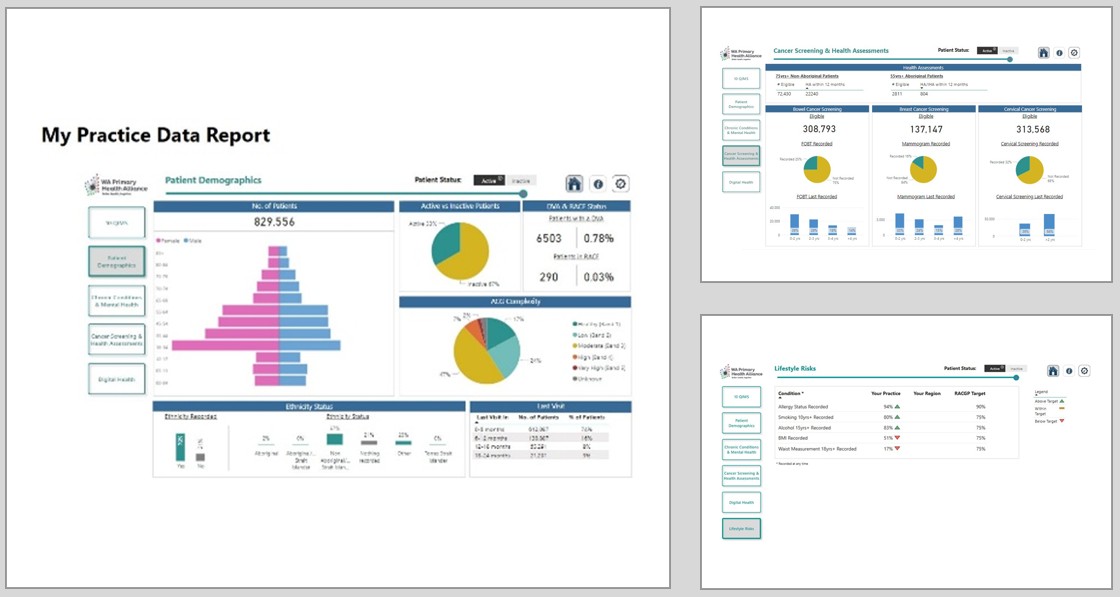
Accessing your practices PCRP
If you are a general practice that shares data with WAPHA via Primary Sense and you have not received an email inviting your practices nominated administrator to access the PCRP, please contact the Practice Assist Help Desk on 1800 2 ASSIST (1800 2 277 478) or 08 6278 7900 or via email practiceassist@wapha.org.au.
Backdating GPACI Patient Registrations
The Department of Health and Aged Care is allowing Practices to backdate their MyMedicare registered patients’ GPACI registration so that the care provided since 1 July 2024 can be accurately captured in the GPACI eligibility assessment.
Background
The General Practice in Aged Care Incentive (GPACI) commenced on 1 July 2024. It replaced the General Practitioner Aged Care Access Incentive (GP ACAI) for Provider Incentives Program (PIP).
Eligibility for the first quarter (July – September 2024) was assessed and payments were processed in October 2024.
Registration errors
Some GPs and Practices provided GPACI-eligible services but didn’t select the GPACI Indicator or a Responsible Provider for their eligible MyMedicare registered patients, or selected the GPACI Indicator and Responsible Provider after the eligible services had already been delivered.
This made them ineligible for GPACI payments. This may also have an effect on future payments as a total of 10 eligible services need to be delivered over the 12-month care period for practices and providers to be eligible for the quarter four payment.
To acknowledge challenges of the transition from GP ACAI to GPACI for the sector, and to ensure practices and providers who delivered GPACI-eligible services are not missing out, for a limited time the department is allowing practices to backdate their patients’ GPACI registration in the system.
Please note practices must backdate their patients’ GPACI registration date for any patients impacted by this error by 31 March 2025.
How
Services Australia has provided detailed instructions, here, which include the criteria that needs to be met when selecting the patient’s GPACI registration date.
When
During each quarterly assessment, the previous three quarters are also reassessed. After practices have backdated their patients’ GPACI registration, if the next quarterly reassessment process determines they met all the eligibility criteria, practices and providers will be assessed as having an underpayment and will get a GPACI payment for the relevant assessment period/s.
Provider ConnectTM is transforming business information management and service provider connectivity
WA Primary Health Alliance have partnered with Provider Connect AustraliaTM (PCATM) to help transform data accuracy and increase digital health interoperability across the Australian healthcare ecosystem. Save time, reduce your administrative workload and securely update your business partner network of any changes to your practice or practitioners by registering with PCA™.
Read our registration guide for more information on how to register, or watch the ‘Reducing red-tape for healthcare organisations with Provider Connect Australia’ video here.

Toolkit for supporting your patients from multicultural communities to overcome barriers to healthcare
We know from research and feedback that multicultural communities can face significant barriers to accessing health care. With more than a third Western Australians born overseas, it is vital we support patients from these communities to overcome language, discrimination, stigma, lack of trust and other barriers that could limit their access to high quality care.
The WA Primary Health Alliance (WAPHA) Multicultural Competency and Capability Framework provides a set of key principles for developing cultural competency within WAPHA and our commissioned service providers and primary care.
The accompanying toolkit has been developed in close consultation with our stakeholders and provides links to key organisations and resources to support culturally safe health service delivery, community support services and translated health information for patients from multicultural communities.
This includes key information and resources for general practice teams and patients on topics including:
- Mental health
- Aged Care
- Sexual health
- General health
This Framework, forms part of the WA Primary Health Alliance suite of cultural competency frameworks, including the Aboriginal Cultural Competency and Capability Framework 2023-2025 and the LGBTIQA+ Equity and Inclusion Framework 2023-2025.
Free multilingual telephone hotline for people affected by overseas conflicts

People living in Australia who are affected by overseas conflicts can call a free, confidential multilingual telephone hotline for information about available support and connection to local services.
The hotline is staffed by bicultural support workers who can speak Arabic, Dari, English, Hebrew and Ukrainian or other languages with an interpreter.
To access the hotline, free call 1800 845 198 from 10am to 7pm (Australian Eastern Daylight Time) Monday to Friday.
Flyers are available to download and share in Arabic, Dari, English, Hebrew, and Ukrainian.

Rising influenza cases during summer – reminder on key measures to protect staff and patients
With influenza notifications continuing to increase above seasonal thresholds, now is a good time to remind staff and patients about the simple but important measures they can take to protect themselves from respiratory infection, including:
- Wash your hands
- Cover coughs and sneezes
- Stay home if you are sick
- Keep surfaces clean
- Get vaccinated
Download the Protect yourself from viruses and How to wash your hands posters for your practice and direct your patients to Healthy WA for more information.
Specific advice to assist in the prevention and control of communicable diseases is also available at the WA Department of Health website.
New AIR Tip on reporting of vaccines administered during pregnancy
A new AIR Update that describes how to report pregnancy status at the time of vaccination to the Australian Immunisation Register (AIR) has been added to the NCIRS website.
This is the latest in a series of short practical guides to help immunisation providers navigate the AIR, which records vaccinations given to people in Australia across the lifespan.
AIR data have a variety of important uses – including the calculation of population-level vaccination coverage estimates.
As noted in our last edition of Practice Connect, it will be mandatory for immunisation providers to report pregnancy status at the time of vaccination to the AIR from 1 March 2025.
Access the new AIR Tip here.
Pertussis cases ‘unusually high’ this year to date, says interim Australian CDC
The interim Australian Centre for Disease Control has publicly noted the ‘unusually high’ levels of pertussis (whooping cough) currently circulating in Australia.
The latest National Notifiable Diseases Surveillance System figures show around 6,600 cases have been reported domestically since the new year – more than double than at the same point of last year.
Last year ultimately saw the highest number of pertussis cases ever recorded in Australia.
The interim Australian CDC also stresses vaccination is the best protection against pertussis – a highly contagious respiratory infection that can cause serious disease and death, particularly in young infants. Vaccination for eligible people is funded under the National Immunisation Program (NIP).
As noted in NCIRS’ new vaccine recommendations for pregnant women resource, pregnant women are recommended to receive pertussis-containing vaccine (which comes as combination diphtheria-tetanus-pertussis formulation) at 20–32 weeks gestation, to protect their babies from birth.
Read the full article here.
First US death from measles since 2015 recorded, as multi-state outbreak continues; Australia on alert
The US recorded its first measles-related death in a decade this week, as an outbreak that is now affecting eight American states continued to worsen. The victim, from Texas, was an unvaccinated child.
Meanwhile, public health authorities in Australia have issued alerts after multiple confirmed measles cases have been detected, with 2 cases believed to be locally acquired (no overseas travel from either person).
Officials are advising healthcare providers to be alert to individuals presenting with fever and rash and to urge patients to ensure they and their loved ones are protected through vaccination.
Measles vaccination coverage rates in Australia, while comparatively high, have declined to below the 95% national target since the COVID-19 pandemic.
After receipt of 2 doses of the measles-mumps-rubella (MMR) vaccine, around 99% of people are immune to measles. In Australia, measles vaccine is provided free for children aged 12 months and 18 months under the National Immunisation Program; catch-up vaccines are also available for those who have missed their scheduled doses.
Access the Measles Handbook chapter of the Australian Immunisation Handbook here.
Access to the WA Immunisation Schedule.
NCIRS travel vaccination FAQs refuelled
The National Centre for Immunisation Research and Surveillance (NCIRS) travel vaccination FAQs resource for healthcare providers and the general public has been updated.
Among other additions, the revised resource now includes specific information on travel vaccination for people who are immunocompromised.
It includes clear guidance on vaccination for children who are travelling internationally; which vaccines are compulsory for people travelling from Australia to Mecca, Saudi Arabia to participate in pilgrimages; and what should be done if a child has missed some of their scheduled vaccinations while overseas.
To see the FAQ’s, click here.
Human Papilloma Virus (HPV) update
Presented by Angela Newbound for the Immunisation Coalition
12 March 2025 (3.00pm to 4.00pm AWST)
With the latest facts about Human Papilloma Virus (HPV) and vaccination, this webinar covers everything you need to know about the disease and available vaccines.
Presented by Angela Newbound for the Immunisation Coalition.
Register here.

WAPHA QI activities in collaboration with Cancer Council WA
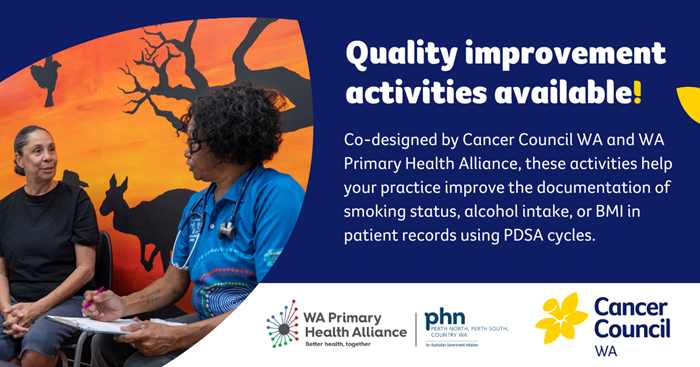
The Quality Improvement Coach team from WA Primary Health Alliance (WAPHA) have joined forces with the Cancer Council WA Education team to collaborate on developing quality improvement activities available to GPs in WA.
These activities are both RACGP and ACRRM accredited for 5 Measuring Outcomes (MO) hours each under the requirements for Continuing Professional Development.
The educational audits will equip GPs with applicable background information and step by step guides on utilising Primary Sense reports to undertake PDSA cycles. These activities are a simple way of improving capture and documentation of risk factors that can be associated with cancer, enabling further screening as appropriate.
For these and other Cancer Council QI activities GPs can register their interest here.
WAPHA’s team of Quality Improvement Coaches can support GPs to run reports and interrogate data using various software and tools, and provide guidance on completing PDSA cycles. To connect with your local WAPHA QI Coach please reach out via QI@wapha.org.au
Own It stakeholder campaign toolkit

The 2024–25 Own It national cervical screening campaign is now in full swing.
To complement the campaign, we have created an Own It stakeholder campaign toolkit and secondary toolkits for Australia’s most under-screened groups.
The toolkits have been published here.
Inside each toolkit you will find:
- key messages
- social media content to share
- quotes from our volunteer talent on cervical screening
- posters, postcards, and email signature images
- social media and posters you can add your own spin to
- resources on cervical screening including in-language material for the Arabic, Cantonese, Mandarin and Vietnamese speaking communities.
If you have any questions or suggestions on other things we could add to the toolkits, please email CancerScreeningCommunications@health.gov.au
2025 Cervical Screening Update webinar
Presented by RACGP in partnership with Commonwealth Department of Health and Aged Care
13 March 2025 (4.00pm to 5.30pm AWST)
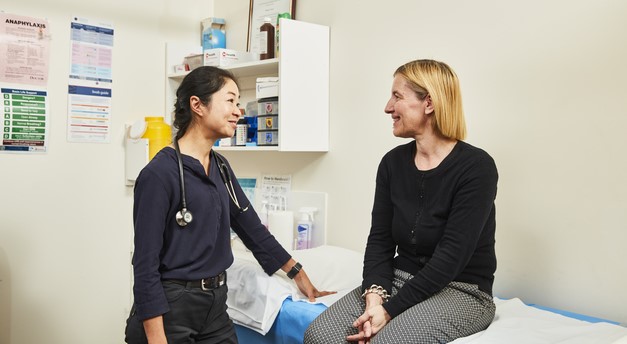
Don’t forget to register here for the upcoming RACGP webinar on the changes to the National Cervical Screening Program Guidelines.
Updated healthcare provider education and training modules are also available on the Australian Centre for the Prevention of Cervical Cancer (ACPCC) website.
The National Cervical Screening Program Guidelines for the management of screen-detected abnormalities, screening in specific populations and investigation of abnormal vaginal bleeding have been updated to incorporate and support best clinical practice.
The new Guidelines are now available here.
A reminder that the new Guidelines will not go live in the NCSR until April.
Discretion and best clinical judgement are to be used regarding the use and ‘compliance’ with the Guidelines during this time.

New JN.1 COVID-19 vaccines well tolerated, new AusVaxSafety data show
Meanwhile, new AusVaxSafety data have shown most participants (72 per cent) experienced no side effects in the first three days following receipt of the adult formulation (aged 12 years and older) Pfizer JN.1 COVID-19 vaccine.
Among those who did report side effects, the most common were local reactions (such as pain, itching, redness and swelling at the injection site), fatigue, muscle or joint pain and headache.
These reactions were generally mild and short-lived, with most resolving within a day. Impact on daily activities was also minimal, with only 4 per cent of recipients reporting missing work, study or routine duties in the week following vaccination.
Access the report here.

Have your say on the accreditation of general practices

The Australian Commission on Safety and Quality in Health Care (the Commission) is seeking feedback on potential changes to the accreditation cycle and assessment of general practices.
Consultation is now open for the general practice sector to share their views on two proposed options:
- Extended accreditation cycle with at least one mid-point review
- Assessment conducted at short notice.
Help shape changes to the National General Practice Accreditation Scheme by:
- Providing feedback through a short online survey or written submission
- Attending an online focus group facilitated by the Commission
- Sharing the consultation resources with anyone in your network who may be interested.
Alternate ideas and suggestions on how the accreditation experience and assessment process for general practices could be improved are also welcomed.
Share your feedback by 4 April 2025, visit safetyandquality.gov.au/NGPA-consultation.

Webinar – Chronic disease management in general practice
Presented by WA Primary Health Alliance
19 March 2025 (12pm to 1pm AWST)

Join us for an insightful and comprehensive webinar designed to equip general practice staff with the essential tools and strategies for effective chronic disease management.
This webinar will feature speakers from WAPHA’s Quality Improvement (QI) team, interactive discussions and practical case studies to help you apply the key learnings in your practice.
Webinar topics:
- Understanding the fundamentals of chronic disease management.
- Developing personalised care plans for patients.
- Implementing evidence-based practices in daily clinical routines.
- Utilising technology and data to enhance patient outcomes.
- Collaborating with multidisciplinary teams for holistic care.
To find out more view the flyer here and register today!
Firearms Health Assessment: What GPs need to know
Presented by RACGP WA
26 March 2025 (7.00pm to 8.30pm AWST)
Join RACGP WA for an overview of the Firearms Act and the reforms that are taking place, including the practical considerations and the role of GPs in terms of the mandatory Firearms Health Assessment (FAHA) process.
We will cover:
- How the FAHA will be rolled out across Western Australia
- The practicalities of the health assessment and how it’s submitted
- IT requirements, safeguards and security in practices
- What role the FAHA plays in the wider firearms licensing process
- Who is eligible to perform the FAHA – and can GPs refuse to conduct one? What are the implications?
- What happens if the patient has not seen you before, or doesn’t have a regular GP
- What happens if there are concerns about a patient’s fitness
- What support is available from WAPOL
- What medicolegal protections are in place for GPs performing a FAHA
Presented by Dr Mariam Bahemia and Dr Richard Taylor. Facilitated by RACGP Vice President and WA Chair Dr Ramya Raman.
As always, there will be a dedicated Q&A session, and the opportunity to submit your questions ahead of time.
Integrating Clinician Assist WA into practice
Presented by Clinician Assist WA
12 March 2025 (12.30pm to 1.15pm AWST) Online

Presented by WA Primary Health Alliance and facilitated by a GP clinical editor, these sessions will demonstrate how to maximise integration of the Clinician Assist website into your clinical practice. Clinician Assist WA is a secure website designed to support GPs offering valuable, localised information to assess, manage, and refer patients in Western Australia.
Paid GP online training: IAR-DST to guide mental health referrals – February and March training dates
Presented by WA Primary Health Alliance
Multiple Dates & Times

WA Primary Health Alliance (WAPHA) is providing GPs in WA with paid online Initial Assessment and Referral Decision Support Tool (IAR-DST) training, designed to help practitioners and clinicians recommend the most appropriate level of care for a person seeking mental health support.
GPs and GP registrars who attend the two workshops will be remunerated $300 and CPD hours are available.
For the latest IAR-DST training dates and registration links, visit the WAPHA IAR-DST webpage.
GP management of patient depression suicidality training program
Metro based case study discussions throughout March 2025
Developed by the Rural Clinical School of WA GPs in collaboration with Psychiatrist, Dr Mat Coleman, this training program is made up of two, CPD accredited modalities:
- Part 1: Online modules: Approximately 90mins to complete all six modules.
- Part 2: Face-to-face case study discussions: Co-led between peers, led by a GP and co facilitated by a psychiatrist. Approximately 90mins duration including light meal.
GPs can choose to do either Part 1 or Part 2 or both. It is recommended GPs complete the online modules prior to attending a case study discussion but it is not mandatory.
View the list of case study discussions currently scheduled throughout the Perth metropolitan area in February – March 2025 or register for online and case study discussions here.
Location and dates for each workshop will be displayed when you choose your preference within the registration form. Online modules can be completed at any time.
WA Rural Health Conference 2025 – Registrations now open!
Presented by Rural Health West
22 & 23 March 2025
Mark your calendars for the WA Rural Health Conference, Pan Pacific Perth on Saturday 22 to Sunday 23 March 2025. Early bird registrations are now open!
This year’s theme, “Strengthening rural WA: One connection at a time,” brings together a diverse range of rural health professionals including:
- Aboriginal health workers and practitioners
- Allied health workers
- GPs, medical practitioners, and medical officers
- Health administrators
- Health organisations and stakeholders
- Health and medical students
- Medical registrars
- Nurses and midwives
The preliminary program is now available, which includes sessions that focus on collaboration, connection, and community impact.
For full details and to take advantage of early bird rates, please visit www.waruralhealthconference.com.au
For any inquiries, please contact the Events Team at warhc@ruralhealthwest.com.au or call 08 6389 4500.
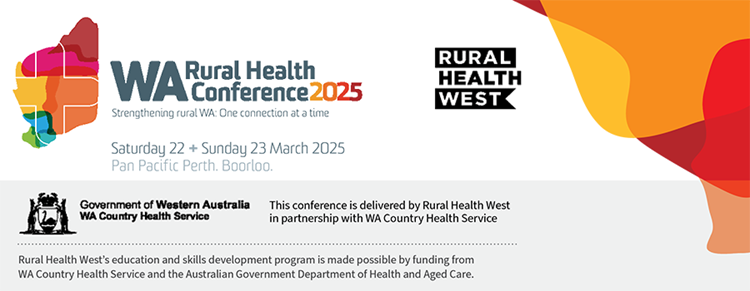
Other Webinars, Events & Workshops
Acknowledgement
WA Primary Health Alliance acknowledges and pays respect to the Traditional Owners and Elders of this country and recognises the significant importance of their cultural heritage, values and beliefs and how these contribute to the positive health and wellbeing of the whole community.


